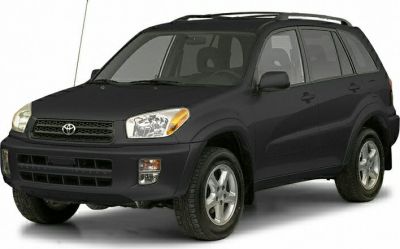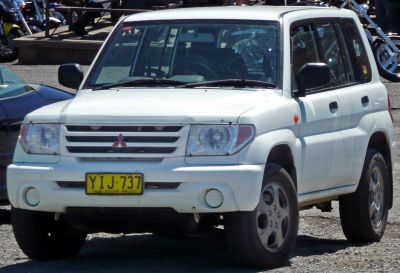 2006 Toyota Rush Dimensions, Size & Specs
2006 Toyota Rush Dimensions, Size & SpecsMeasurements of the 2006 Toyota Rush, engineered for optimal performance and comfort
| Dimensions | |
|---|---|
| Length: | 3995 mm157.3 in13.1 ft |
| Width: | 1695 mm66.7 in5.6 ft |
| Height: | 1705 mm67.1 in5.6 ft |
| Weight Specifications | |
| Curb Weight: | 1150-1190 kg2535-2624 lbs |
| Tire Specifications | |
| Tire Size: |
|
The 2006 Toyota Rush, produced from 2006 to 2008, is a compact SUV designed to offer a balanced combination of practicality and urban-friendly dimensions. Measuring 3995 mm (157.3 inches) in length, 1695 mm (66.7 inches) in width, and 1705 mm (67.1 inches) in height, the Rush is sized to provide ample interior space while maintaining maneuverability in tighter city environments. Weighing between 1150 to 1190 kilograms (2535 to 2623 pounds), this SUV strikes a good balance between sturdiness and fuel efficiency. The Toyota Rush is equipped with 16-inch tires, specifically sized at 215/65R16, which contribute to its stable ride and confident handling characteristics. Its relatively compact footprint makes it an ideal choice for consumers seeking an SUV that navigates easily on urban roads yet still offers the elevated driving position and versatility typical of SUVs. Overall, the 2006 Toyota Rush represents a well-rounded vehicle in its segment, combining functional dimensions with reliable Toyota engineering.
Discover the standout features that make the 2006 Toyota Rush a leader in its class
Have a question? Please check our knowledgebase first.
The 2006-2008 Toyota Rush measures 3995 mm (157.3 inches) in length, 1695 mm (66.7 inches) in width, and 1705 mm (67.1 inches) in height. These dimensions position the Rush as a compact SUV, suitable for urban and suburban environments, offering maneuverability without compromising interior space.
The curb weight of the Toyota Rush from this generation ranges between 1150 kg and 1190 kg (approximately 2535 to 2623 pounds). This relatively light weight for an SUV contributes to enhanced fuel efficiency and agile handling, which is beneficial for everyday driving and easier parking in tight spaces.
The Toyota Rush of this generation comes equipped with 215/65R16 tires. This tire size balances ride comfort and road grip, providing sufficient sidewall height for absorbing road irregularities while maintaining stability and traction, important for an SUV designed for both city roads and light off-road situations.
The Rush's dimensions—3995 mm long, 1695 mm wide, and 1705 mm tall—generally allow it to fit comfortably into a standard residential garage, which is typically about 2440 mm (8 feet) wide and 4880 mm (16 feet) deep. Its height of 1705 mm (67.1 inches) also fits well under typical garage door clearances, making it convenient for home parking.
The Toyota Rush offers a practical interior layout with seating usually configured for seven passengers, which is relatively rare for a compact SUV. This gives it an advantage over many compact SUVs which typically seat five. Although interior dimensions are compact given the vehicle size, the Rush is optimized for space utilization, making it ideal for families or groups needing a bit more seating without stepping up to a larger SUV.
With a width of 1695 mm (66.7 inches), the Toyota Rush is relatively narrow for an SUV, enhancing its suitability for narrow urban streets and easier parking. This compact width helps drivers maneuver in tight spaces and crowded parking lots, which is especially advantageous in densely populated or older cities with limited street width.
Standing at 1705 mm (67.1 inches) tall, the Toyota Rush offers a higher seating position compared to many sedans and hatchbacks, which provides improved road visibility and a commanding driving posture. This height is competitive within the compact SUV segment and contributes positively to headroom inside the cabin, although it may slightly affect aerodynamic efficiency compared to lower-profile vehicles.
The 2006-2008 Toyota Rush was the generation's initial production model, so there was no predecessor model of the Rush itself prior to it in Toyota’s lineup. However, compared to other Toyota models occupying similar market segments at the time, it introduced a compact yet versatile SUV format that emphasized seating capacity and urban practicality.
Compared to similar compact SUVs from competitors, such as the Honda CR-V or Suzuki Grand Vitara of that era, the Toyota Rush offers a slightly smaller footprint in length and width but compensates with a seven-seat configuration, which is less common among compact SUVs that generally accommodate five passengers. Its lighter curb weight and tire setup focus on urban and light off-road usability rather than heavy-duty off-road capability.
The Toyota Rush provides versatile interior space, with foldable rear seats allowing a balance between passenger seating and cargo capacity. While exact cargo volume figures vary, the three-row seating setup allows owners to either maximize passenger capacity or fold down the third row to increase cargo room. This flexible configuration is ideal for users who need to carry both passengers and bulky items on different occasions.
Discover similar sized cars.

| Production: | 1997-2003 |
|---|---|
| Model Year: | 1997 |
| Length: | 3980 mm156.7 in |
| Width: | 1695 mm66.7 in |
| Height: | 1675 mm65.9 in |

| Production: | 1998-2005 |
|---|---|
| Model Year: | 1998 |
| Length: | 3975 mm156.5 in |
| Width: | 1680 mm66.1 in |
| Height: | 1710 mm67.3 in |
